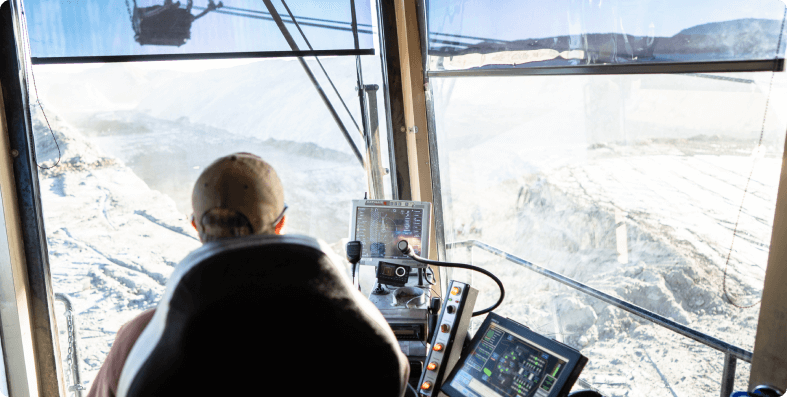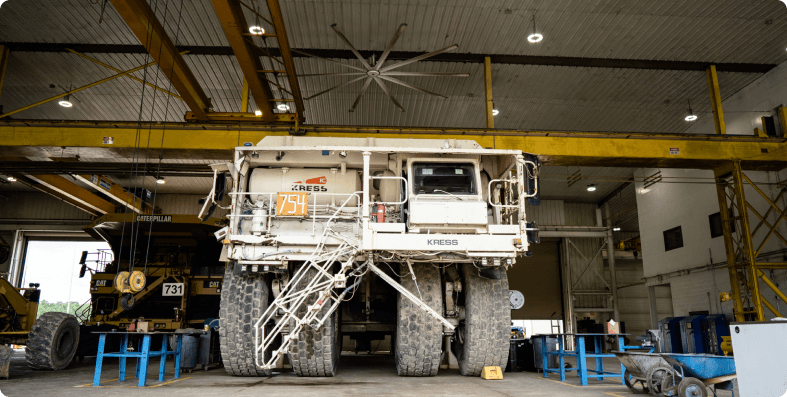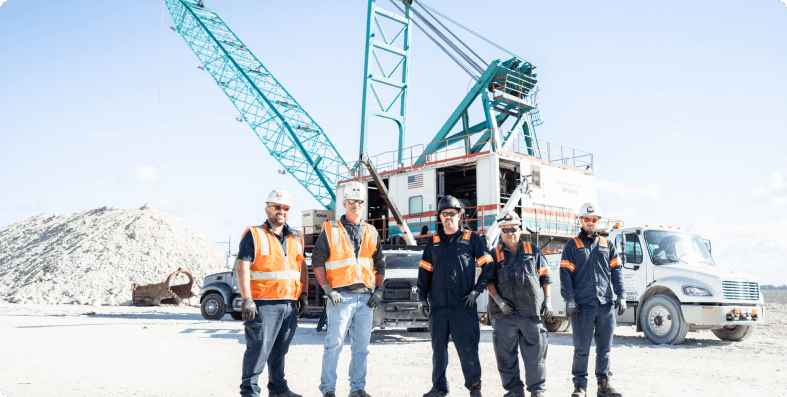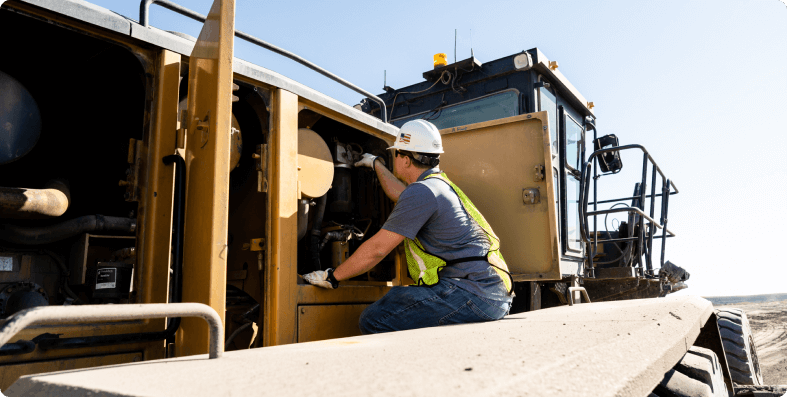Remember Top Gun when Maverick and Goose walk down the runway in their aviators and flight suits?
That’s how cool heavy equipment operators are.
Sure, they don’t fly fighter jets, but they operate machines that cost hundreds of thousands of dollars. And to us, nothing looks cooler than a hard hat and high vis vest.
But what do equipment operators do?
We'll walk you through some machines they use, types of work they do, and a few other parts of the job that may surprise you.
Let's get started.
What does a heavy equipment operator do?
 Heavy equipment operators work in all industries in the Dirt World, such as paving, mining, and construction. They use machines to do tasks that are too big, difficult, or time-consuming to do by hand.
Heavy equipment operators work in all industries in the Dirt World, such as paving, mining, and construction. They use machines to do tasks that are too big, difficult, or time-consuming to do by hand.
Operators prepare sites for infrastructure like roads, homes, sewers, and power plants. They help build and maintain that infrastructure. And they mine materials to make products ranging from cars to cell phones to pocket knives.
Essentially, heavy equipment operators help mine and build the things society needs.
What types of machines do heavy equipment operators use?
 Equipment operators use all types of machines, depending on the job they’re doing. There are too many to cover here, so we’ll just touch on a few of the basics.
Equipment operators use all types of machines, depending on the job they’re doing. There are too many to cover here, so we’ll just touch on a few of the basics.
You’re probably familiar with the typical machines you’d see on a jobsite, like:
- Excavators
- Backhoes
- Bulldozers
- Skid steers
- Loaders
- Motor graders
- Scrapers
- Rollers
Heavy equipment operators may know how to run several of these machines, or they may specialize in one or two.
Some of them also use special heavy equipment—like paving machines or continuous mining machines. These help pour asphalt and extract raw materials from underground, respectively.
Check out more about articles heavy equipment.
What types of work does a heavy equipment operator do?
 There’s a myth that equipment operators just drink Red Bull and chew sunflower seeds.
There’s a myth that equipment operators just drink Red Bull and chew sunflower seeds.
But the truth is, you’d be amazed what a skilled operator can do in the right machine. Here are some—but definitely not all—of the possibilities.
Paving
Paving projects are one of the most common places where you can see heavy equipment operators doing their thing.
They do the groundwork to prepare the site, grading to make sure it’s level and compacting the earth so it can safely support a road, runway, or other infrastructure.
They use paving machines to lay down asphalt and rollers to level it out. Plus, they have special equipment like asphalt millers and asphalt brooms that help them recycle or dispose of old asphalt.
You’ll see heavy equipment operators paving when you drive through road construction. But they also do other projects, like driveways and airport runways.
Earthwork
Earthwork is a broad term that covers a lot of what heavy equipment operators do. Let’s look at a few types of earthwork.
Earthworks
Earthworks are structures that heavy equipment operators build out of earthen materials like soil, rock, sand, or gravel. Examples of earthworks include an earthen levee or railroad embankment.
Excavation
Basically, excavation is digging. But it’s digging that happens on a massive scale and requires skill and precision.
Equipment operators do all sorts of excavation—like digging basements, landfill pits, or snow mazes for mountain resorts. They can even do a type of underwater excavation called dredging that helps restore waterways and make them passable for boats.
Trenching
Trenching is the process of digging a path where crews can install pipes, conduits, or cables. Trenches are narrower than most excavations, and they can be many miles long.
Equipment operators use heavy machinery to dig trenches to the proper width and depth. They must also make the trench at the right grade—so, not too steep or too flat.
Boring
Boring is a cool process where equipment operators use giant directional drills and horizontal augers to create a hole through the ground without disturbing the surface.
It’s a great way to install pipes and other underground systems when you can’t disrupt the environment or other infrastructure. For example, operators may have to bore under the interstate because they can’t dig a trench across it.
Tunneling
When tunneling, heavy equipment operators dig large, underground passages. If you’ve ever driven through a tunnel in the mountains, you can thank an operator. They also make tunnels for trains, subways, underground water systems, sewers, and more.
Watch the start of a tunneling project.
Backfilling
Backfilling is when heavy equipment operators put dirt back into trenches and holes.
For example, they may cover up a new fuel pipeline, add soil to make a foundation level, or reclaim a surface mine. And in underground mines, backfilling empty tunnels called stopes helps keep the mine stable so it won’t collapse and injure anyone.
For equipment operators, backfilling is an important way to help finish projects, eliminate safety hazards, and restore environmental areas.
Mining
Operators use different equipment depending on the type of mine they work at and what their job is.
At surface mines, they may use excavators to unearth mineral deposits or loaders to put raw materials in haul trucks. Or they may use more unusual equipment, like draglines and remote-controlled dozers.
In underground mines, operators often use specialized equipment like continuous mining machines to chisel minerals out of the earth.
Land clearing
When it’s done right, land clearing can be great for society and the environment.
Heavy equipment operators help clear land to make room for new structures like roads, hospitals, and schools.
They can also clear land to help prevent natural disasters, like wildfires. For example, bulldozer operators with CALFIRE use their machines to create firebreaks. This keeps fires from spreading, which saves people's homes and lives.
Demolition
If you like taking things apart, you could have a future as a demolition equipment operator! They get to use all sorts of excavator attachments and other machinery to tear down, remove, or modify old structures.
See a demolition crew in action.
Loading and unloading materials
In the Dirt World, there’s always material in one place that needs to go somewhere else. It could be soil from an excavation site, mined materials that need to go into a crusher, or the wreckage of a demolition project—to name a few.
Heavy equipment operators help load these materials into haul trucks, so truck drivers can transport them to buyers or disposal sites. Operators may also help unload trucks at the next destination.
What else does an operator do?

While running their machines is top priority, that’s not all operators do. Let’s take a look.
Take care of their machines
The best operators take care of every machine like they own it—even if they don’t. They know if the machine doesn’t work, they don’t work.
It’s common sense for safety, too. Heavy equipment is big and powerful, so if something goes wrong, things can get dangerous fast. Taking proper care of the machines helps prevent accidents.
Two ways operators care for their heavy equipment are machine walkaround inspections and regular maintenance.
Machine walkarounds
Operators walk around their machine and inspect it before they climb onboard. They make sure it's safe to operate and look for potential mechanical problems. If they see something wrong, they report it so the machine can get fixed.
Regular maintenance
Heavy equipment may be bigger and more expensive, but it needs regular maintenance just like a car.
Operators should know basic equipment maintenance and their machine’s maintenance schedule—which is in the operation and maintenance manual (OMM) that should be onboard every machine.
Stay safe—and help keep others that way
Equipment operators don’t work in a bubble. There are people, supplies, vehicles, and other machines all around them. A mistake in a multi-ton machine can cause serious damage or even take someone’s life.
So it’s absolutely critical for operators to stay up-to-date on their safety training and follow it in the field.
Use new technology
Technology is rapidly changing in the Dirt World. That's good! Better technology makes work safer and easier. And it frees people up to do more projects to benefit society.
It's important for equipment operators to learn about new technology and how to use it.
For example, older machines didn't have GPS. Operators needed a really good eye and a really good grade checker to stay on track. Today, operators still need those things—but GPS gives them a huge advantage. They get more info about what they're doing and how to do it precisely.
Train upcoming operators
Everybody has to start their career somewhere. One of the best ways to learn? From experienced operators who want to pass down their knowledge!
Operators who have years of experience often help teach newer crew members how to do walkaround inspections, run machines safely and efficiently, and work well with people on the ground.
In fact, some machines even have an instructor’s seat so the experienced operator can ride along with the rookie and teach them the ropes.
Takeaways
Heavy equipment operators have really cool jobs running really cool machines. They get to pave roads, mine raw materials, build snow mazes, and literally move mountains.
But at the end of the day, what they really do is help mine and build the things society needs to survive and thrive.
Interested in becoming a heavy equipment operator? See if you’ve got what it takes and try out some free operator training videos.





Comments